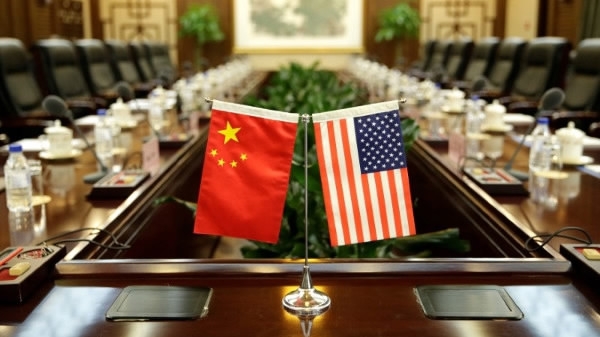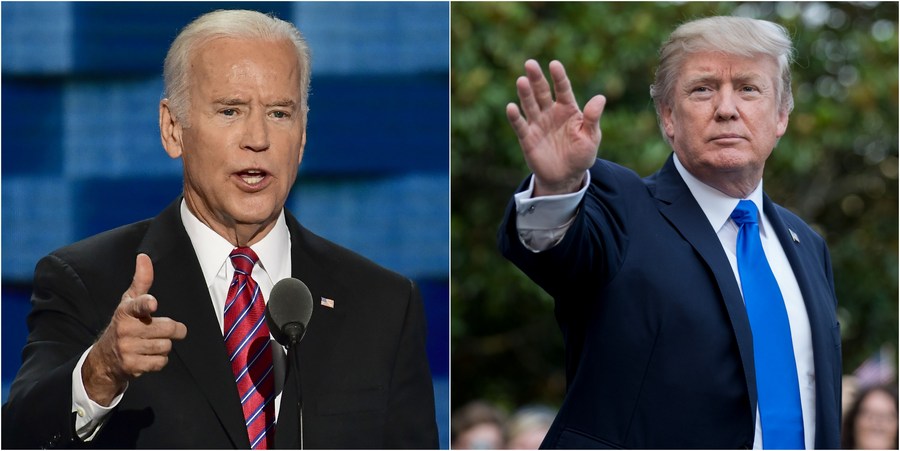
Editor's note: Bobby Naderi is a journalist, a guest contributor in print, radio and television, a documentary filmmaker and a member of the Writers Guild of Great Britain. The article reflects the author's opinion and not necessarily the views of CGTN.
A new Pew study says the number of countries with a favorable view of the United States has hit a record low.
This is hardly surprising. America's downturn and foreign policy failures continue largely because it is obsessed with trying to contain China.
It is such a bold step, but this is where China's role may come in handy to help stop that process of decline and dysfunction. That is, if the "declinist power" is also willing to rethink fundamental policies, including the tech war. Beijing took a similar step earlier this year when it signed phase one of a trade deal with Washington that lifted U.S. stocks and further opened the Chinese market to American companies.
Finding common ground
China and the U.S. are trading partners, and the key to their future prosperity and growth is greater cooperation in international trade and security. It would be a vote of confidence in win-win relations, in which they opt for a strategic partnership of promise and opportunity, and not protectionism and containment.
When it comes to resolving important global issues, such as establishing security and stability, Beijing and Washington have interests at stake. This is where they can find common ground through teamwork in almost everything, from containing the novel coronavirus and finding a vaccine to accelerating global economic recovery.
In a similar fashion, the two countries are expected to forge closer technological cooperation and collaborative innovation. Entrepreneurs and researchers on both sides of the Pacific cannot work and benefit together if the U.S. keeps adding Chinese tech companies to its so-called Entity List or carries out sanction measures to protect American competitors.
China has no intention to take advantage of America's isolationist policies and declines to advance its image as the next global leader. Far from it, it is trying to build partnerships for a shared future and prosperity. To that end, China shares the positive impacts of globalization through the Belt and Road Initiative (BRI). The project to link the infrastructure and trade of Southeast Asia, Eurasia and Africa to China has been a success story. It has contributed greatly to regional and international prosperity and stability.

Joe Biden and Donald Trump attend their respective events on different occasions. /Xinhua
Joe Biden and Donald Trump attend their respective events on different occasions. /Xinhua
The U.S. needs to move in the same direction, which means working with China and other nations to meet international challenges. The U.S. is anything but exceptional. It must set aside the isolationist approach and think beyond its comfort zone.
Economic integration
The two economies depend on each other for prosperity and growth. China and the U.S. can be great strategic partners too and focus more on mutual development and growth. Given economic integration, China has become America's key industrial supplier. Any attempt to decouple the two complementary economies is unrealistic, impossible and impractical. The costs would be enormous, and the risk of further damage to America's image prohibitively high.
The U.S. dollar dominates the international monetary system and accounts for about 60 percent of global trade. China is one of the engines of the global economy, and its huge foreign exchange reserves are also denominated in the U.S. dollar. The U.S. can strengthen the dollar system by broadening cooperation with China in the financial industry and providing better business opportunities in the two complementary economies and financial markets.
Consider it a sign of the times, but as maintained by the Pew and several other international polls, America is left in a ditch and in decline while China's economy is on the rise. Recent data showed that it grew by 4.9 percent in the third quarter. And it is looking for international partners. This may include cooperation in developing high-tech industries, such as next-generation information technology and telecommunications, advanced robotics, artificial intelligence and aerospace engineering. The order of the day is that despite the unruly technological competition, China is still willing to work with the U.S. in high-tech fields.
In these acrimonious times, it's a reality well worth noting. The U.S. cannot restore its disparaged and dwindling image and influence without China, both nationally and internationally. The next U.S. administration needs to take this fact into account and stop taking the country farther in the wrong direction by not stripping away the façade of the empty claims that America's national security is at risk from China. Such a policy reassessment is essential regardless of who goes to the White House in 2021.
(If you want to contribute and have specific expertise, please contact us at opinions@cgtn.com.)